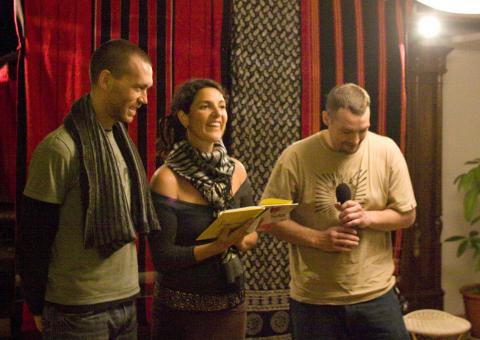People sit on heavy carpets, illuminated by soft lighting and scented candles in a darkened room, drinking wine and listening to poetry and prose recitations and a capella songs.
Reminiscent of the literary salons of 18th-century France, this modern-day gathering put on by The Red Room Group happens on the third Saturday of every month.
This weekend fundraising is being added to the roster for the first time, with 50 percent of the NT$200 admission fee going to Playing for Change, a charity that builds music schools in impoverished areas of Africa and Nepal.

photo courtesy of The Red Room Group
The monthly events began in 2009, when a collection of friends came together with “the idea of creating a space in Taipei where people could enjoy the experience of sharing anything they wanted and be heard and accepted,” says Ayesha Mehta, one of the event’s nine founders.
Her brother Manav, an events and music manager, and her mother Roma, a businesswoman and artist, teamed up with others, including architect Leiven Hwang (黃立文) and organizer Prashantha Lachanna, to create the group.
A friend offered to let the group use a space at his workplace; they dubbed it the Red Room because of its deep red carpets.
Performers sign up for a five-minute slot at a welcoming table when they arrive — or sometimes a little later.
“New people are terrified,” Lachanna says. “But after the first half, the sheet starts to fill up rapidly. After a few drinks people start to pull out what they’ve been hiding.”
Hwang notes that the biggest development over the past couple of years is that a lot more Taiwanese are attending and performing, “sharing really intimate things that have affected them.”
‘VISIBLY VIBRATING’
“They come up and talk about their lives,” Lachanna says. “It’s so against the stereotype of what Taiwanese people are like — [they talk about how] they love to travel, love to love, there’s a feeling that they are dying to share, exploding with wanting to share so that you see sometimes they are visibly vibrating with happiness and the relief of sharing.”
All types of people participate.
“A 70-something-year-old Beijing opera-singing noodle vendor that has a noodle stand near Renai circle came,” she says. “[The crowd was] 90 percent 20-something Taiwanese kids, this guy got up and sang Beijing opera about a young man going to war … who sees a young woman and gets a visible erection … it’s a sad love story.”
Hwang interjects to explain that the literal translation for “erection” was “his fern straightened,” which he says amused an audience that was already so spellbound that “every single person was mesmerized, every mouth was hanging open.”
Lachanna says participants also help out behind the scenes “at the bar, door, kitchen, just stepping in” to do what is needed.
“The magical thing about the event is that it’s run by whoever participates, creating its own vibe every time,” said Manav Mehta, who often emcees the event. “The energy in the Red Room space is incredibly positive and supportive and even with a high percentage of newcomers each month, the intimacy and the magic never fade.”

Behind a car repair business on a nondescript Thai street are the cherished pets of a rising TikTok animal influencer: two lions and a 200-kilogram lion-tiger hybrid called “Big George.” Lion ownership is legal in Thailand, and Tharnuwarht Plengkemratch is an enthusiastic advocate, posting updates on his feline companions to nearly three million followers. “They’re playful and affectionate, just like dogs or cats,” he said from inside their cage complex at his home in the northern city of Chiang Mai. Thailand’s captive lion population has exploded in recent years, with nearly 500 registered in zoos, breeding farms, petting cafes and homes. Experts warn the

The unexpected collapse of the recall campaigns is being viewed through many lenses, most of them skewed and self-absorbed. The international media unsurprisingly focuses on what they perceive as the message that Taiwanese voters were sending in the failure of the mass recall, especially to China, the US and to friendly Western nations. This made some sense prior to early last month. One of the main arguments used by recall campaigners for recalling Chinese Nationalist Party (KMT) lawmakers was that they were too pro-China, and by extension not to be trusted with defending the nation. Also by extension, that argument could be

Aug. 4 to Aug. 10 When Coca-Cola finally pushed its way into Taiwan’s market in 1968, it allegedly vowed to wipe out its major domestic rival Hey Song within five years. But Hey Song, which began as a manual operation in a family cow shed in 1925, had proven its resilience, surviving numerous setbacks — including the loss of autonomy and nearly all its assets due to the Japanese colonial government’s wartime economic policy. By the 1960s, Hey Song had risen to the top of Taiwan’s beverage industry. This success was driven not only by president Chang Wen-chi’s

The centuries-old fiery Chinese spirit baijiu (白酒), long associated with business dinners, is being reshaped to appeal to younger generations as its makers adapt to changing times. Mostly distilled from sorghum, the clear but pungent liquor contains as much as 60 percent alcohol. It’s the usual choice for toasts of gan bei (乾杯), the Chinese expression for bottoms up, and raucous drinking games. “If you like to drink spirits and you’ve never had baijiu, it’s kind of like eating noodles but you’ve never had spaghetti,” said Jim Boyce, a Canadian writer and wine expert who founded World Baijiu Day a decade